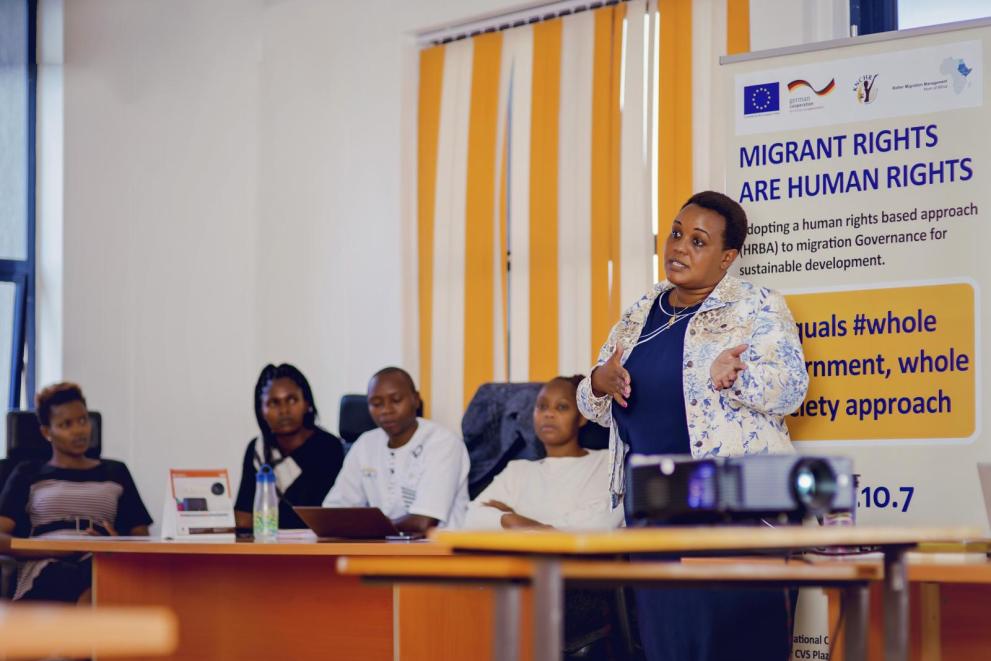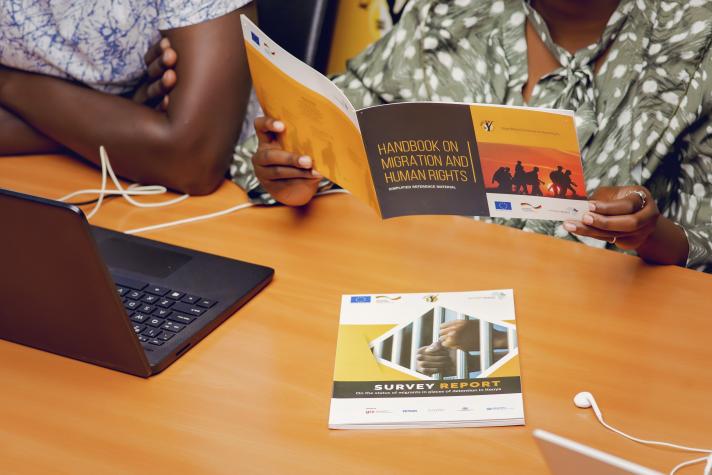
Alone in a foreign country, migrants face myriad challenges such as the lack of family support, language barriers and missing access to information and services. However, the situation is even more challenging for irregular migrants or victims of human trafficking, as they are more vulnerable to human rights violations. They face numerous situations of exploitation such as unpaid domestic work, child labour or sexual exploitation, often without any access to justice. These are some of the key challenges observed by the Kenya National Commission on Human Rights (KNCHR) in its advocacy work on migration and human rights.
Its aim is to ensure the promotion and protection of human rights as explains its Deputy Director, Veronica Mwangi: ‘We work to empower state and non-state actors to apply a human rights-based approach in migration governance as one way of enhancing respect for the rights of migrants through comprehensive policies. This helps reduce violations of migrant rights and support the government with fulfilling its constitutional obligations of safeguarding human rights and dignity for all.’
Support to Kenyan authorities
‘The KNCHR continues to play a pivotal role in supporting the Government of Kenya in enhancing migration governance through its membership in Kenya’s National Coordination Mechanism (NCM) on migration,’ says Charles Munyao, head of the NCM secretariat. The mechanism is an inter-agency coordination committee hosted by the Directorate of Immigration to coordinate all activities related to migration. ‘All agencies such as immigration, statistics, health, social affairs, education and civil society organisations address their needs, including for support to and protection of migrants,’ Charles Munyao adds.
The KNCHR has also been instrumental in the development of key documents: it contributed to the drafting of the National Migration Policy and the Migration and Human Rights Curriculum and of various policies to support the government in countering human trafficking.
Furthermore, the KNCHR has been working closely with other national human rights commissions in the Horn of Africa to enhance learning about the role of national human rights institutions in protecting migrants’ rights, and in particular supporting governments with preventing human trafficking.
Awareness-raising and recommendations for safeguarding migrants’ rights
‘Our core mandate remains to protect and promote human rights for every person in Kenya,’ Veronica Mwangi remarks. The KNCHR actively monitors complaints of human rights violations and conducts the necessary investigations. ‘Now we train the staff of recruitment agencies and civil society organisations to enhance reporting and case management of violations reported by migrants,’ she adds.
In 2019, the KNCHR finalised a study on the status of migrants in detention that unearthed some violations against migrants, including victims of trafficking. Cruel treatment during arrest, discrimination in prison, failure to meet deadlines when going to court and lack of appropriate legal, medical, and psychosocial assistance were among the challenges that victims of trafficking may face. ‘What was apparent was the lack of clear guidelines and proper procedures for processing migrants out of police custody,’ Mwangi says. ‘The criminalisation of victims of trafficking is a major cause of injustice. KNHCR is lobbying the government and relevant stakeholders for reforms to protect migrant rights.’
Increased role and recognition
Since 2017, the KNCHR has partnered with the Better Migration Management (BMM) Programme. ‘Human and technical capacity in dealing with human rights violations against migrants has improved remarkably in the commission,’ Veronica Mwangi explains.
She notes that before ‘our role was limited to highlighting instances of general human rights violations in the media and reports, nothing more. But that has changed. Today, the commission has a fully-fledged programme on migration and human rights, enhanced complaints management of cases on violations of migrants’ rights, and well-trained staff and partners.’
Background
The Better Migration Management Programme (BMM), financed by the European Union through the EU Trust Fund for Africa and the German Federal Ministry for Economic Cooperation and Development (BMZ), aims to improve migration management in the Horn of Africa region. All activities follow a rights-based approach to prevent the criminalisation of victims of trafficking and are conducted with full respect for the rights of migrants. Members of human rights institutions receive training on migrants’ rights and on complaint mechanisms for human rights violations with a particular focus on special interest groups such as children, persons with disability and women. The KNCHR received training and support with conducting their policy engagements, development of internal policies and programming on migration and human rights to enhance the promotion and protection of human rights of migrants.
Details
- Publication date
- 18 May 2022
- Region and Country
- Horn of Africa
- Kenya
- Thematic
- Improved migration management
- Partner
- GIZ

